The best BBQ Delivery Boxes in the UK from small sustainable British Farms
We’ve all heard a variation of the ‘joke’: “What did the woman say to the pub landlord? That’s not the point. What was she doing out of the kitchen?”
Well, for this year’s International Women’s Day, we’re recognising the women challenging the status quo in the fields, on the fishing boats and in the kitchen. We mean, one even is the pub landlord.
The women below are pushing sustainability, regeneration and ethics forwards within food and making space for other women to do so, too.
We find out how their work is changing the face of the industry and women’s place in it, the challenges they’ve faced along the way, and what more there is to be done…
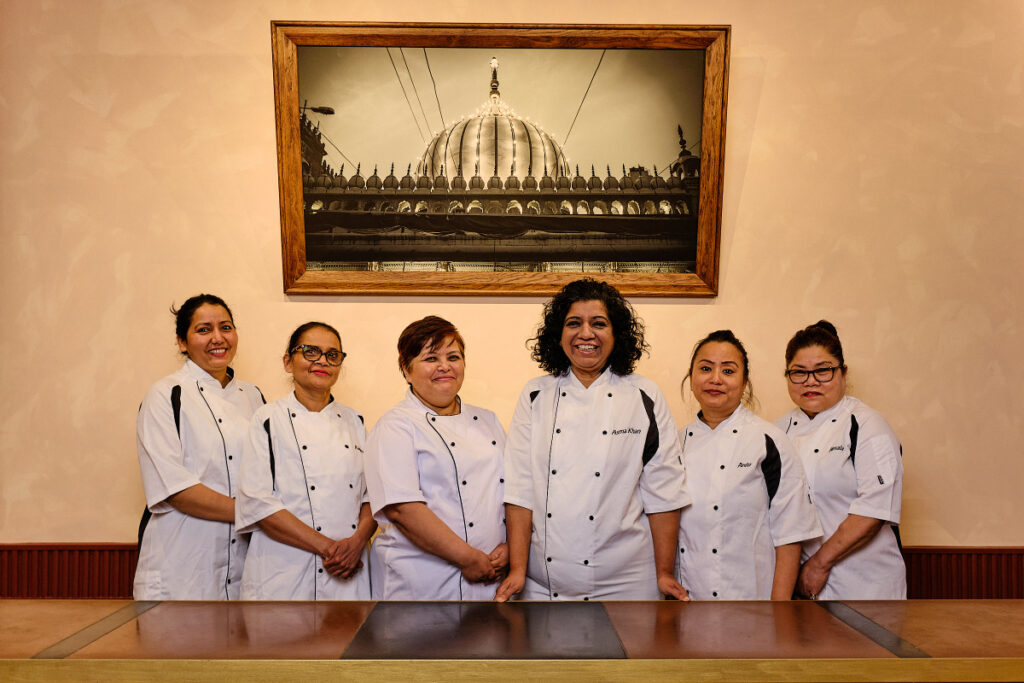
Asma Khan
When you walk into Asma Khan’s new restaurant in Kingly court, the first thing you see is the open kitchen, full of women. So highly does Asma regard them, that she eloquently compares them to an Indian goddess.
“They are Shakti – a goddess in our culture – these women have great power and are women of substance,” she says.
Restaurant owner and cookbook author, Asma opened her first restaurant, Darjeeling Express, on Carnaby Street in London back in 2017. What was special here, aside from fact that the entire kitchen workforce was made up of South Asian women, was that they weren’t formally trained.
Asma’s restaurant has been pivotal in raising the profile of women in kitchens, which you could argue has had a global effect following her episode in Netflix’s hit show, Chef’s Table. She proves that formal training is not a prerequisite to work in a top restaurant and rejects the idea that her team aren’t professional cooks: “What certificate do they have to show? They have life experience,” she insists.
Her reason for running her restaurant is a deep rejection of the way women are viewed in society – as home cooks, not professional chefs.
“In every home in India, Pakistan, Bangladesh, Sri Lanka, it’s the matriarch who’s in charge of cooking, who’s feeding the families. So my restaurant is a battle cry against this narrative that we are not professional,” she explains.
Asma is fully aware that “the power in hospitality is not with women”. She says: “I don’t want to teach women how to cook. I want to teach them how to lead”.
This is an excerpt of a longer interview. Read full interview with Asma Khan, here.
Follow Asma: @asmakhanlondon
Follow Darjeeling Express: @darjleeingldn
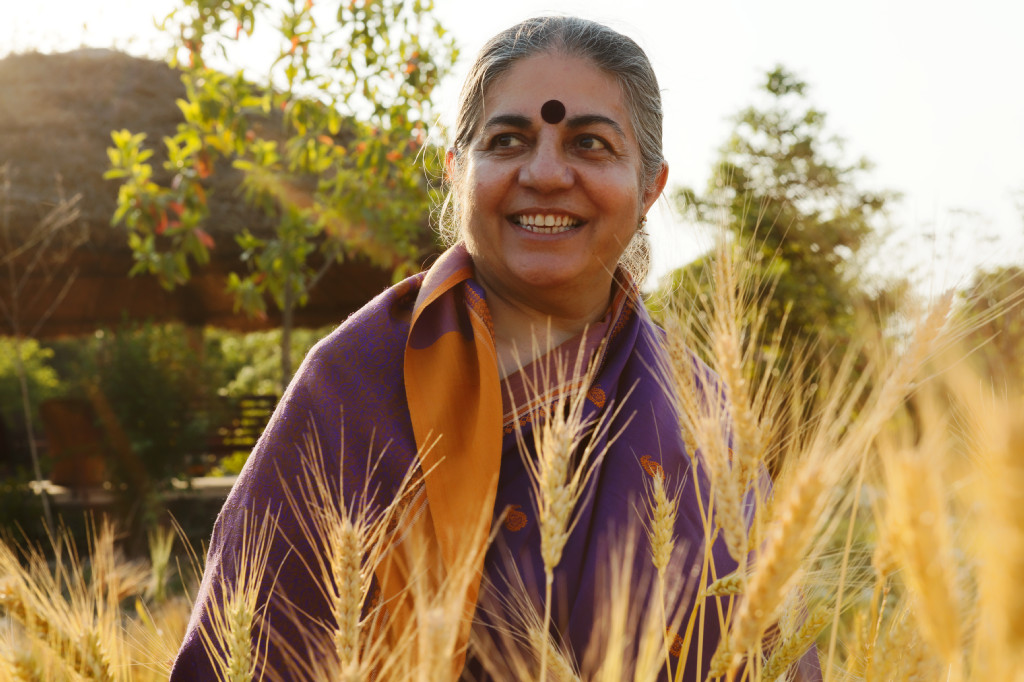
Vandana Shiva
Known as the ‘Gandhi of Grain’, Dr Vandana Shiva’s work in ecology, environmentalism and food sovereignty is world-renowned.
Vandana is a figure-head in eco-feminism, which she describes as looking at “the links between the violence against nature and violence against women, and the regeneration of nature and the empowerment and liberation of women“.
Eco-feminism is not only recognising the value of nature beyond its financial worth, but womens’ work within it, too. As Vandana explains that women’s work is not “just undervalued, it’s invisible”.
While researching her book titled eco-feminism, co-written with German sociologist, Maria Mies, Vandana was surprised to learn that most farmers across the world are women, and not men as the majority of us might initially think.
For her, the movement focuses on how “women have been left to take care of life, which is the most important part of the economy”, but isn’t seen that way, by the current patriarchal capitalist society.
Women are often the carers of society, and the ones who notice what nature’s doing too. It is because of this role women take on, they’re the first to see “a well disappear, a river getting poisoned, seeds disappearing”, which is why Vandana compares them to “canaries in the coal mine”.
Vandana sees the capitalist patriarchal economy as only interested in what it can extract from the earth, as “it only measures what you can take out of the mud”.
She adds that if the economy was redefined on eco-feminist philosophy, it would mean “you don’t financialise nature, but you recognise its value“.
This is an excerpt of a longer interview. Read full interview with Vandana Shiva, here.
Follow Vandana: @drvandanashiva
Read more: vandanashiva.com
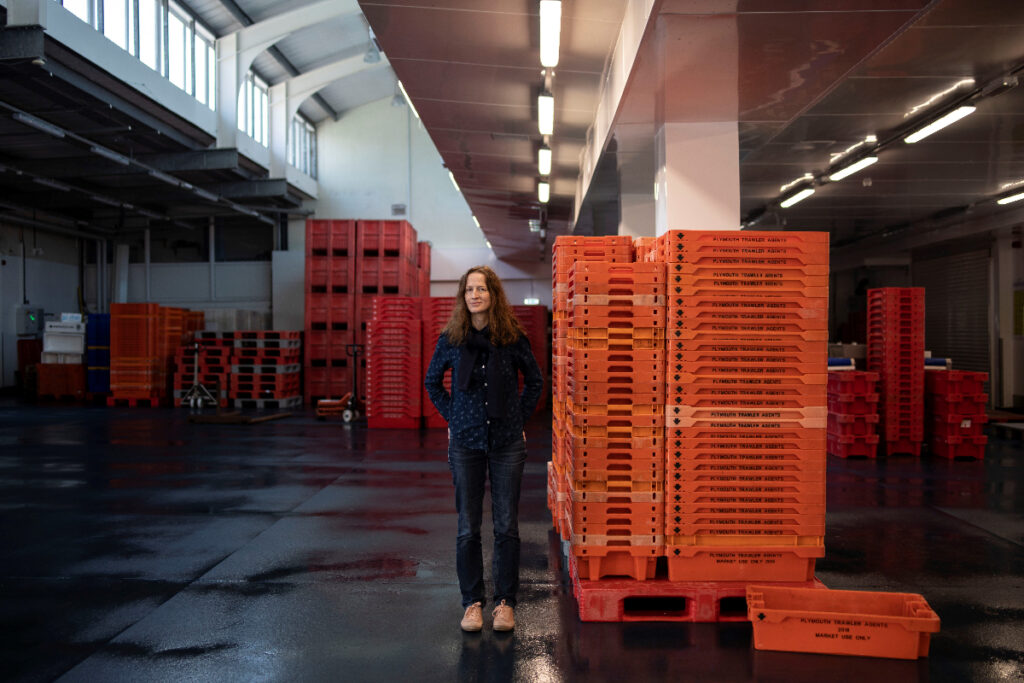
Caroline Bennett
Caroline Bennett opened a conveyor belt sushi restaurant, Moshi Moshi, in London in 1994, at a time when many people didn’t even know what sushi was.
As fishing industrialised Caroline began to find it “virtually impossible to find non-farmed fish” for the restaurant. To bridge the gap, she started her own business, Sole of Discretion, in 2016.
Sole of Discretion’s distinguishing feature is that it sells truly traceable fish. “Supermarkets seem to go out of their way to make it difficult to know where fish really comes from,” Caroline says.
Caroline pushes for better ethics and sustainability in the fishing industry, and helps to forge an understanding of truly sustainable fishing practices. The Sole of Discretion system actively supports small scale fishers, which are boats of 10-metres or less. She’s currently working on a certification supported by the Soil Association, which she hopes will be her legacy. “And then I can retire”, she jokes.
The aim is that the certification label will make it easy for people to distinguish between low impact caught fish and those caught by industrial fishing methods, which are highly destructive to the marine environment.
Crucially, it goes far beyond the criteria that the Marine Stewardship Council (MSC) currently does, which doesn’t “recognise any human element”. Human trafficking is a huge problem with larger boats.
Caroline believes fishing stopped being sustainable when “women stopped being involved in fisheries”. “Women have played a massive part in fisheries for so long,” she explains, they were “traditionally the ones who processed the catch once it was landed on the quayside”.
She even goes as far to say that “I can’t imagine a successful ethical, sustainable fishery going forward without women’s involvement“.
This is an excerpt of a longer interview. Read full interview with Caroline Bennett, here.
Follow Sole of Discretion: @sole_of_discretion
Read more: soleofdiscretion.co.uk
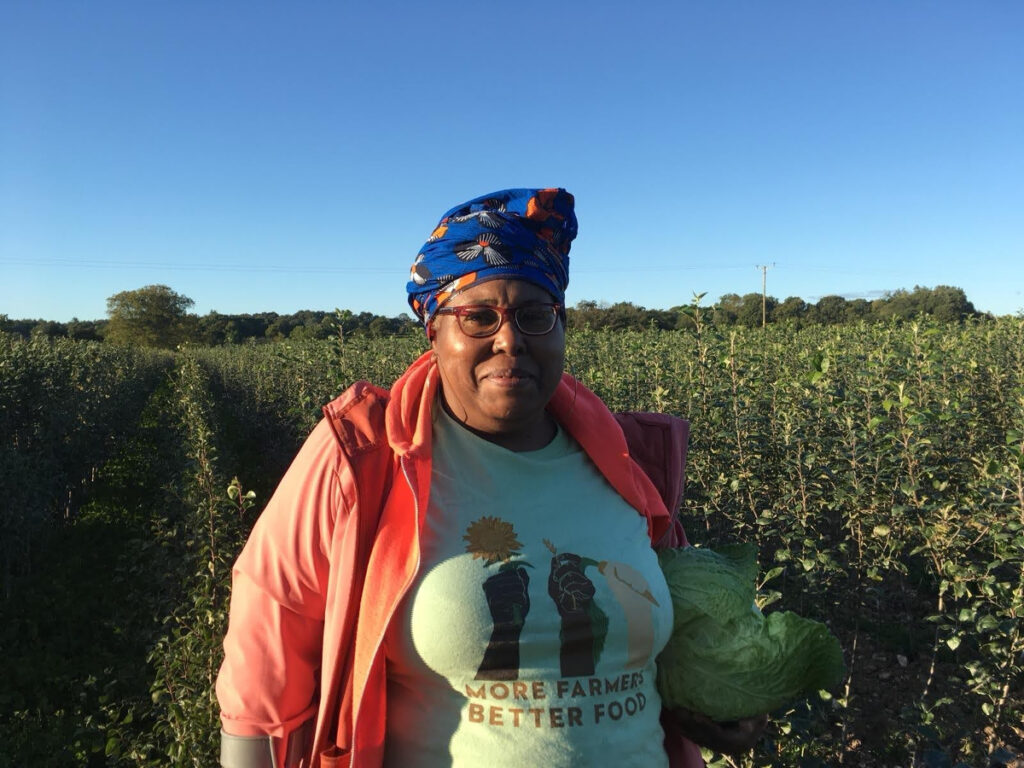
Dee Woods
Dee Woods works on too many inspiring and worthy projects to describe their work as one thing, but in their own words, Dee describes their overarching aim as “building empathy into the food system”, which “starts from the grassroots”.
Dee tries to bridge the empathy gap, and approaches their work through intersectionality, by considering multiple issues at one time. For Dee, focusing on just one issue isn’t enough. It’s an “understanding of how our food system intersects with social systems, with our personal and emotional cultural life,” they explain.
To give an idea of just a few of Dee’s roles, they include being the co-founder of Grenville Community Kitchen, which is working to reimagine our localised food systems. They’re also involved in the politics of food, working with the London Food Board and the Land Worker’s Alliance, where they’re the food justice policy coordinator, as well as working with Land in our names (LION), a collective that looks at land justice.
Dee also does a lot of work campaigning for women’s work in food (and other) areas still to be recognised. “Women do work that isn’t recognised within the food system,” they say. “For example, most farmers’ wives aren’t recognised as contributing to the actual success of any farm in terms of everything from running the farm and animal care, to crop planning, to budgeting, you name it. We have so many growers, people, women and diverse genders who just aren’t recognised.”
Dee is a revered voice in the food world but thinks “showing up as myself as my authentic self and having that voice, inspiring other people to participate” has been their biggest impact. It’s clearly working.
Although, Dee says there’s still a lot to be done. “We need more women, more people of colour within the policy space. I think most people are put off and think that they need some special knowledge or a particular degree. But you don’t need any special qualifications. None whatsoever. I have no qualifications, except from the University of life,” says Dee.
This is an excerpt of a longer interview. Read full interview with Dee Woods, here.
Follow Dee: @Didara
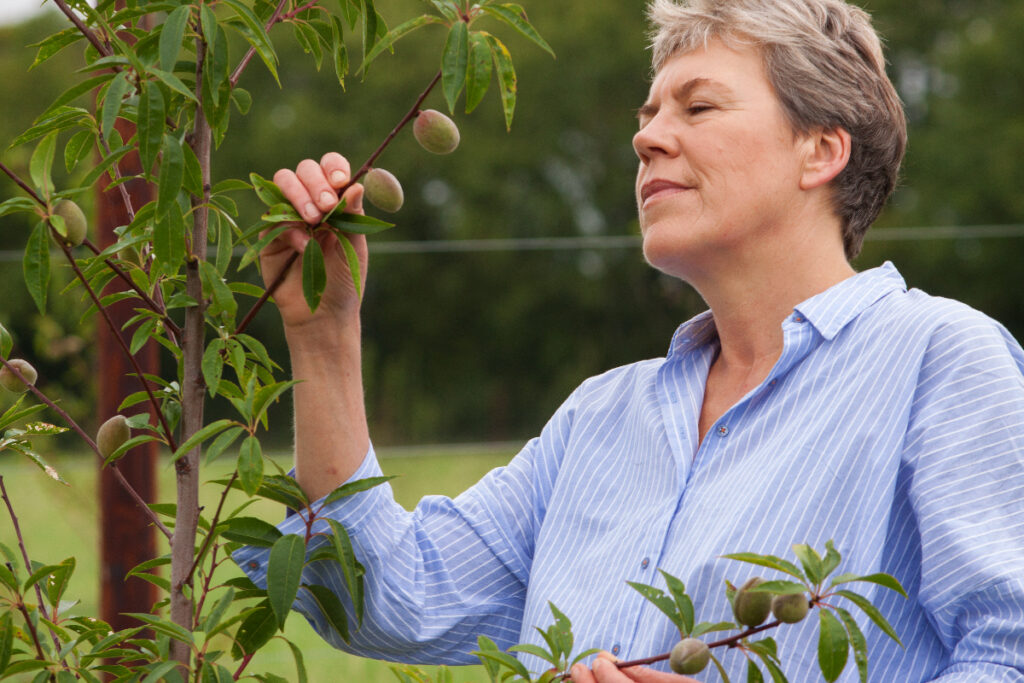
Helen Browning
Helen Browning is no doubt best known for her organic farm, which is aptly named after her, Helen Browning Organics.
But since 2016, she’s been expanding her organic farming practices to include agroforestry, the practice of including trees and shrubs on farms where crops are also grown in a bid to increase biodiversity as well as improve the crops.
It’s a growing movement worldwide, and Helen is at the forefront.
“All throughout my farming career, I’ve tried to be different,” she says. “I was a novelty in my 20s, as a female farmer. Not only that, I was going organic and on tenanted land – so I had to make a profit, and at scale,” Helen says.
“If I was discriminated against it was more because I was organic or had ‘weird ideas’ than because I am a woman. I was a curiosity early on. But in some ways being a woman led to more opportunities on farming boards, even 30 years ago, I had lots of opportunities. In most ways it’s been an advantage rather than a disadvantage.”
But that doesn’t mean she thinks there’s not more to be done in this space. “I would still encourage fathers to think of their daughters when it comes to the farm,” she says, as traditionally it’s the oldest son/only son who takes it over, while women are still typically overlooked.
Taking over her father’s farm aged just 24, Helen was inspired to follow a farming career by her great aunt who also farmed. During the Second World War, lots of women took over roles that were previously held by men. Along with three other women, her great aunt worked the farmland, where they all successfully used their different skills to keep it going. “They looked like they were having enormous fun going hunting and drinking whisky. They led very independent lives as women, when others were still very much constrained,” Helen explains.
Although women have always had their place working on the farm, it’s often tended not to be as farm managers. “I’d like to see more women able to make a professional career out of farm management,” she says.
Luckily for Helen, her daughter has even followed in her farming footsteps too, on her own accord. Helen said she was “thrilled when she showed an interest”. And so, the tradition continues…
This is an excerpt of a longer interview. Read full interview with Helen Browning, here.
Follow Helen: @Helenbrowningsorganic
Read more: helenbrowningsorganic.co.uk
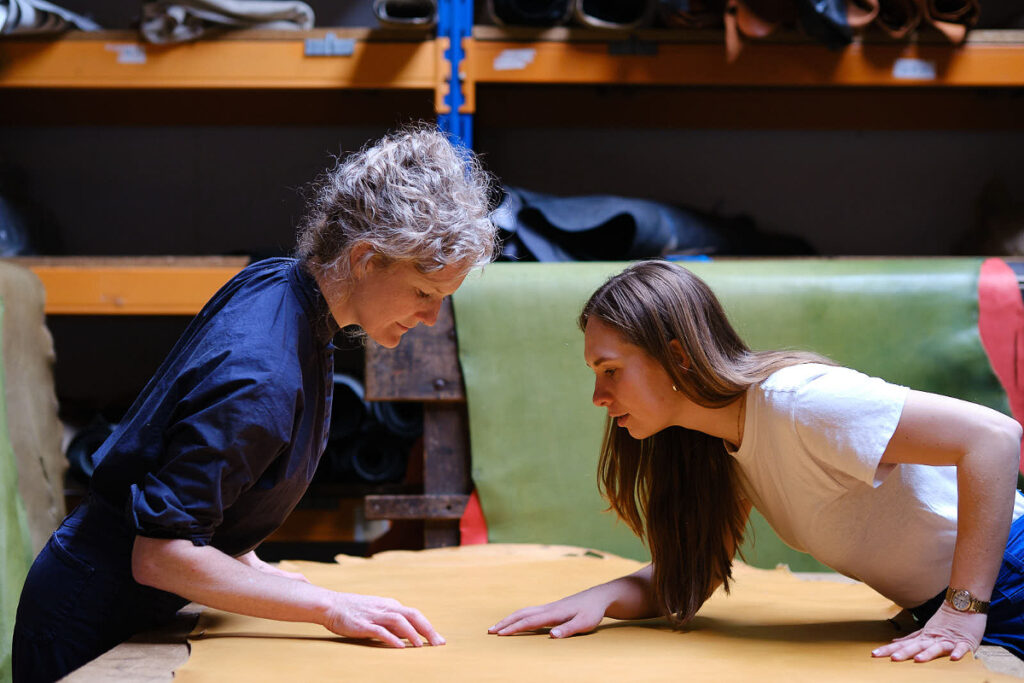
Alice Robinson and Sara Grady
Alice Robinson and Sara Grady have embarked on producing leather from cattle hides raised on regenerative farms in a bid to “link regenerative agriculture with material culture,” says Sara. The duo aim to create a new supply chain by adding value to hides, which are often be discarded.
Instead, they want to use the natural leather hides in a meaningful way – one that is a world away from much of the polypropylene-coated leather we use today.
One of the most important things they’re doing is bringing value to the hide, as it’s typically worth just 1% of the overall carcass’ value. Adding value means it “becomes a co-product of those businesses,” says Sara, rather than just a by-product. They do this by “giving an additional payment to the farmer, to reward them for adding more value to it,” she adds.
There’s plenty of work to be done to shift what Alice describes as “people’s intolerance to imperfection” in leather products. “Natural leather is full of story,” says Alice in regards to the natural grain, look and feel of leather. “We really aren’t acquainted with leather in any way that tells us about the origins of that material and about the life that that animal lived,” adds Sara.
There’s clearly a long way to go, but change is starting to happen…
This is an excerpt of a longer interview. Read full interview with Alice Robinson and Sara Grady, here.
Follow them: @british.pasture.leather
Read more: britishpastureleather.com


